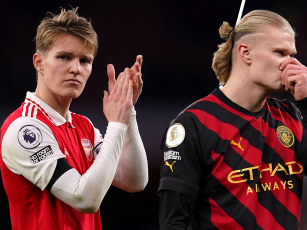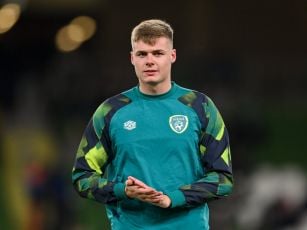In a tournament featuring two dozen teams there is always the risk that things get over-simplified, especially when it comes to the outsiders, and the nuances get lost.
But when it comes to Sweden being a one-man team, almost entirely dependent on their single superstar Zlatan Ibrahimovic, it’s pretty much true.
Take their penultimate pre-Euro friendly against Slovenia in Malmo.
With plenty of empty seats around the ground, Zlatan sat on the bench in his hometown during an incredibly dull scoreless draw. The biggest cheers of the night were when his face appeared on the big screen.
Having netted over half of Sweden’s goals in qualifying and dragged them through a playoff against Denmark almost by the sheer force of his will alone, he is undoubtedly their marquee player – but is he all they have?
The answer is yes and no. Sweden have plenty of competent players, but no-one anywhere near the class of Ibra, who will arguably be remembered as the greatest Swedish player of all time when he eventually hangs up his boots.
Much like Ireland, gone are the days when the Swedes could boast a squad bristling with Premier League-quality players such as Fredrik Ljungberg, Olof Mellberg and Jesper Blomqvist.
These days, their club addresses are more modest, and even if many of them are flying below the Irish radar and there is no huge strength in depth, there are still plenty of players for the Irish to watch out for.
Key among these is Emil Forsberg - an old-fashioned winger whose Champions League performances for Malmo earned him a move to Red Bull Leipzig in Germany, Forsberg has grown considerably in recent years.

Sweden's Emil Forsberg, right challenges for the ball with Montenegro's Vladimir Bozovic during the Euro 2016 Group G qualifying soccer match between Montenegro and Sweden, at the City Stadium in Podgorica, Montenegro, Saturday, Nov. 15, 2014. (AP Photo/Risto Bozovic)
His biggest strength is his ability to change pace in a split second, stopping on a sixpence and then taking off again at high speed, in whatever direction he chooses, his blond hair flopping as he goes.
As well as a good engine he has a few tricks up his sleeve, and he is never happier than when cutting in off the left wing and causing chaos with his favoured right foot. The more games he plays in the gold of Sweden, the more influential he becomes.
Sweden’s soft-centered defence has also been strengthened somewhat by the inclusion of Benfica’s Victor Nilsson Lindelöf, a powerful, confident central defender who is well capable of taking the ball out from the back.
The two talent pools from which the newer players are drawn are Malmo’s recent Champions League squads and the under-21 side that won the 2015 UEFA European Championships, with plenty of overlap between the two.
Reserve goalkeeper Robin Olsen, now at FC Copenhagen, was between the sticks for Malmo in the Champions League two seasons ago, and defenders Pontus Jansson and Erik Johansson and midfielder Oscar Lewicki have all worn the sky blue of the southern Swedish club in Europe’s premier competition.
Of the under-21s the best-known is perhaps mischievous striker John Guidetti, who has spent time on loan at Celtic. A typical poacher in the box, Guidetti brings enormous energy to the squad on and off the field, but he is likely to play second fiddle to Marcus Berg in the race to partner Ibra up front.
Sweden’s real hidden treasure is Emir Kujovic, who was top scorer in Sweden’s Allsvenskan in 2015 with 21 goals in 29 games as his unfancied IFK Norrköping side won the title.
He has already netted seven goals in nine games this season, but he is not just a goal-scorer. The 27-year-old possesses tremendous vision and intelligence, and is one of the few players in the Swedish squad capable of making all those around him play better.
But for all the fresh legs and hidden gems, there are a few ageing stalwarts still hanging around cluttering up the place.

Manager Erik Hamren ©INPHO/Lorraine O'Sullivan
With loyalty being both a strength and a weakness of coach Erik Hamrén, the likes of Kim Källström and Sebastian Larsson will probably end up playing a much bigger role at the Euros than they should.
CSKA Moscow midfielder Pontus Wernbloom is a genuinely decent and funny guy off the pitch; on it, he is technically limited and a red card waiting to happen.
Jimmy Durmaz and Erkin Zengin are also in the squad, which probably has more to do with the fact that Zlatan likes their company than their recent performances, and given that both are most likely to be deployed on the wings, this may blunt Sweden’s creativity.
But undeniably, the elephant in the room is Zlatan, and all the talk in Sweden is of him.
During the spring the papers and the airwaves have crackled with speculation about where he would wind up next, with Manchester United and a slew of other clubs linked to his signature.
Seldom mentioned was the fact that he is 34, past his prime and has spent four years playing for Paris Saint Germain in a sub-standard league.
That is not to say that he is no longer capable of moments of gob-smacking genius – he is. It is just to note that it can’t go on forever.
Ibra has trained sporadically since teaming up with the squad, and there are doubts about his ability to follow a long season with a series of do-or-die games in close succession.
But that is of no relevance to Ireland - if fit, he will start well-rested in the first game in Paris on June 13.
Regardless of the under-21 success and the Malmo generation, whoever Hamrén chooses to line out alongside him will make little or no difference; if Ireland fail to stop Ibra in Paris, they will fail to stop Sweden.
Download the brand new OffTheBall App in the Play Store & App Store right now! We've got you covered!
Subscribe to OffTheBall's YouTube channel for more videos, like us on Facebook or follow us on Twitter for the latest sporting news and content.








